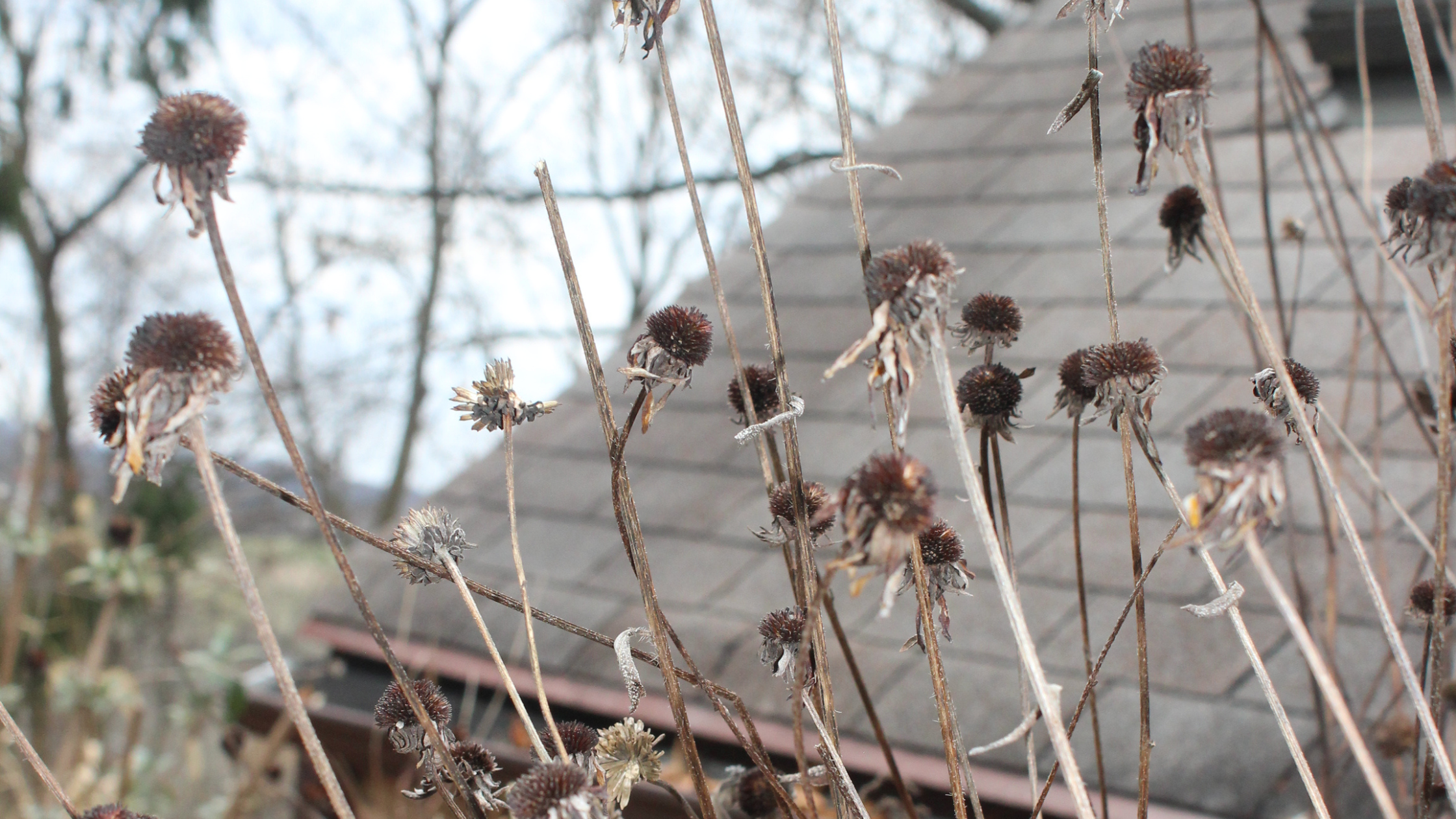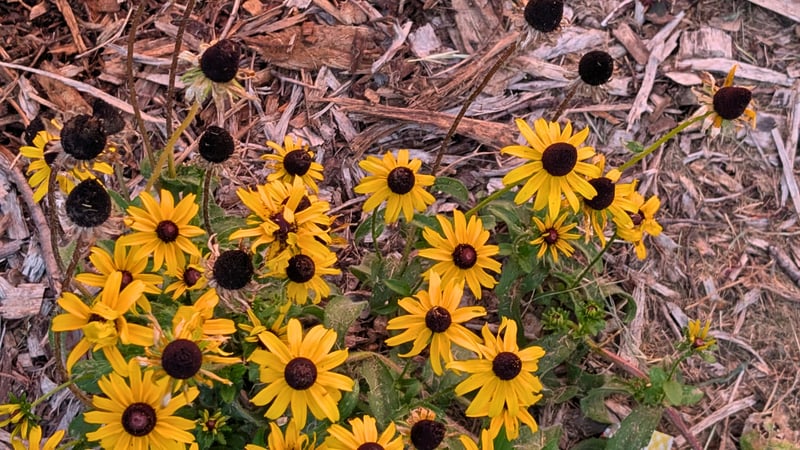As gardeners, we're often taught to deadhead flowers—removing spent blooms to encourage new growth and maintain a tidy appearance. While this practice can result in a certain garden aesthetic and prolong blooming, it's important to reconsider this habit, especially when it comes to native plants. After pollination, flowers have served their purpose and dry up so the plant can focus its energy on developing the seeds that are result of pollination. Leaving these dried, seed-filled flowerheads intact offers significant ecological benefits by supporting songbirds and other seed-eating wildlife. Here’s why you should consider letting nature take its course in your garden.

The Importance of Seed Heads for Wildlife
![]() Food Source for Birds: Native plants produce seeds that are a vital food source for many bird species. For example, the seeds of purple coneflowers (Echinacea purpurea) are a favorite of goldfinches, while black-eyed susans (Rudbeckia hirta) attract a variety of sparrow species. By leaving the seed heads on your native plants, you provide a natural and essential food supply for these feathered friends.
Food Source for Birds: Native plants produce seeds that are a vital food source for many bird species. For example, the seeds of purple coneflowers (Echinacea purpurea) are a favorite of goldfinches, while black-eyed susans (Rudbeckia hirta) attract a variety of sparrow species. By leaving the seed heads on your native plants, you provide a natural and essential food supply for these feathered friends.
Habitat for Insects: Dead flowers and stems offer hiding places and overwintering sites for beneficial insects, including pollinators like bees and butterflies. Many native bee species, such as mason bees, lay their eggs in the hollow stems of plants like bee balm(Monarda fistulosa) and raspberry canes. Leaving these structures standing can help support the populations of these important pollinators. Additionally, insects that overwinter in your garden within plant stems, flowerheads, and fallen leaves become a crucial food source for birds early in the spring.
![]() Cover and Nesting Material: In addition to providing food in the form of seeds, the dried stalks, flowerheads and foliage of native plants provide cover for small mammals from rabbits to chipmunks, countless insects, as well as birds. This shelter is a critical component of habitat that helps small animals hide from predators and escape bad weather, from summer thunderstorms to harsh winter conditions. In spring and summer, these natural materials can also be used for building nests or lining burrows. Think of the fluffy seed heads of milkweed as perfect nesting material for birds!
Cover and Nesting Material: In addition to providing food in the form of seeds, the dried stalks, flowerheads and foliage of native plants provide cover for small mammals from rabbits to chipmunks, countless insects, as well as birds. This shelter is a critical component of habitat that helps small animals hide from predators and escape bad weather, from summer thunderstorms to harsh winter conditions. In spring and summer, these natural materials can also be used for building nests or lining burrows. Think of the fluffy seed heads of milkweed as perfect nesting material for birds!
Other Benefits of Not Deadheading
-
Natural Garden Aesthetics: Embracing the natural look of a winter garden can be beautiful. The silhouettes of seed heads covered in frost or snow add texture and interest to the winter landscape. This approach not only supports wildlife but also celebrates the changing seasons and the inherent beauty of native plants in all their stages.
-
Soil Health and Erosion Control: Leaving plant material in place helps protect the soil from erosion caused by wind and rain, especially during the winter months. The decomposing plant matter also enriches the soil with organic material as it naturally composts in place, promoting a healthy garden ecosystem.
-
Reduces Garden Maintenance: Allowing plants to go through their natural life cycle reduces the need for fall cleanup. This means less work for you and more benefits for your garden’s inhabitants. It’s a win-win situation where nature takes care of itself, and you enjoy a thriving, biodiverse garden with minimal effort.
How to Incorporate This Practice in Your Garden
If you prefer a tidier garden, consider selective deadheading. Only prune out half of the spent flowers, or leave the seed heads of keystone native plants that offer extra value to wildlife such as asters and goldenrods while trimming others. This compromise allows you to enjoy the benefits of both approaches.
You can also designate a section of your garden where you allow all plants to go to seed naturally. This area can become a dedicated habitat for wildlife, offering food and cover throughout the seasons. Consider adding a water feature like a birdbath or shallow dish to provide drinking water for birds and insects.
Another option is to collect the dead flowers into “seed bouquets” and hang them around your yard as a natural bird feeder. Though this will diminish the long-term habitat benefit for most insects and other animals, they’ll still provide a food source for seed-eating birds.
Once your garden is in order, share the benefits of this practice with your gardening community! You can find many resources online, like the National Wildlife Federation's Native Plant Finder and Garden for Wildlife's Online Store to help you choose plants right for your area. By educating others about the importance of leaving native plants intact, you can inspire more gardeners to adopt wildlife-friendly practices.

Resisting the Urge to Deadhead Your Native Flowers
By understanding the vital role native plants play in supporting wildlife we can make informed decisions about how we manage our gardens. The choice to not deadhead isn't just about aesthetics; it's a conscious effort to create a sustainable and biodiverse ecosystem. By embracing the natural cycle of growth, decay, and renewal, we can nurture a thriving garden that benefits both us and the wildlife that we share our space with.
So keep the wildlife in mind and resist the urge to deadhead your native flowers. Let them stand tall, offering their gifts to the wildlife that depends on them. In return, you'll be rewarded with a garden full of life in every season.
